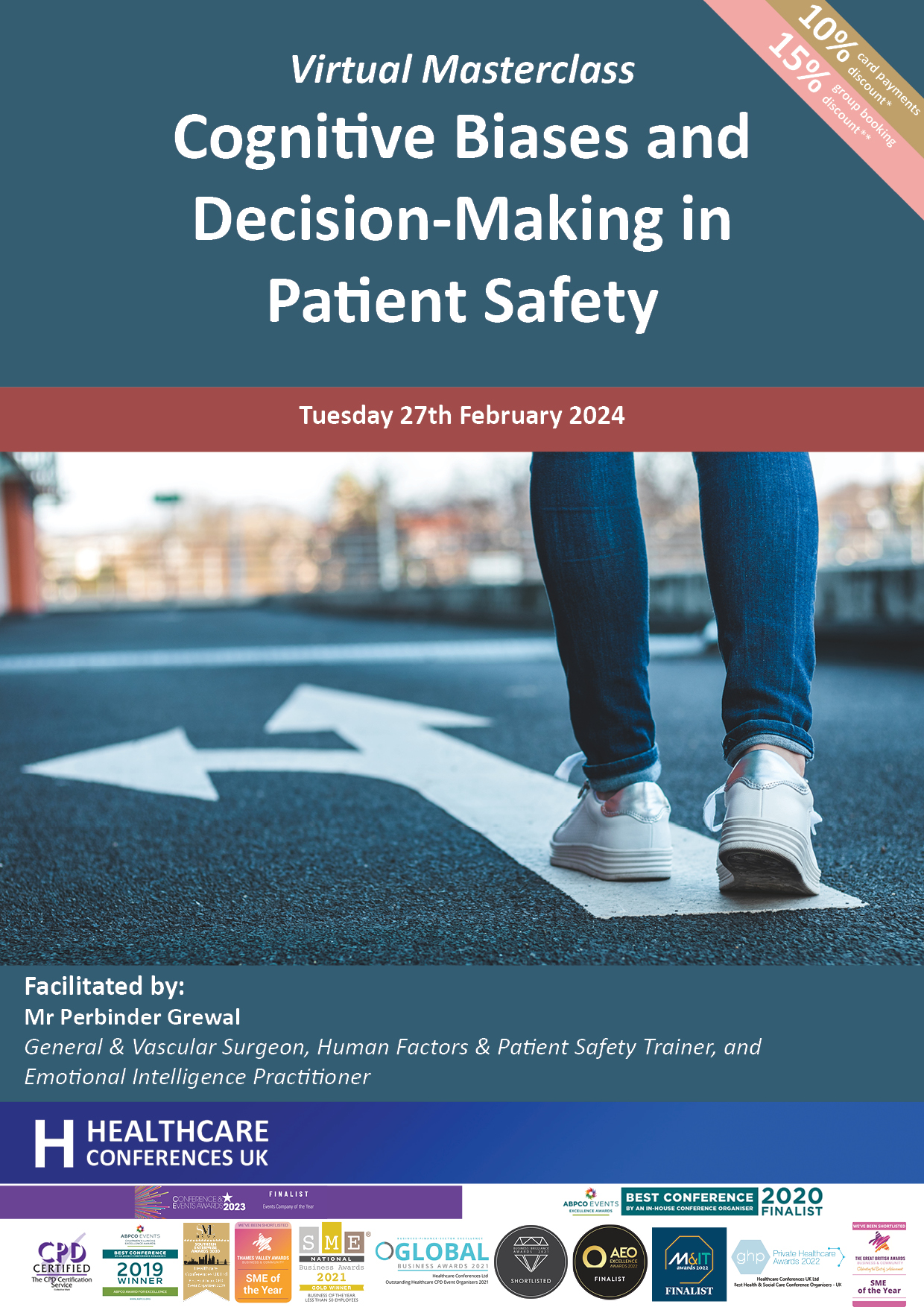Find out more about virtual attendance
COURSE OUTLINE
As healthcare professionals, our primary goal is to provide the best possible care to our patients. One crucial aspect of achieving this goal is understanding how cognitive biases can influence our decision-making processes and, ultimately, patient safety.
Throughout this masterclass, we will explore the key cognitive biases that affect healthcare decision-making, their impact on patient safety, and practical strategies for recognizing and mitigating these biases. By addressing these biases, we can improve the quality of care we provide, enhance patient outcomes, and promote a culture of safety and continuous learning within our healthcare organizations.
Through a combination of evidence-based research, real-world examples, and case studies, we will delve into the psychological underpinnings of these biases and the strategies that can help us overcome them. By the end of this masterclass, you will be equipped with the knowledge and tools to navigate the complex landscape of clinical decision-making with greater awareness, leading to more informed, accurate, and patient-centered decisions.
We are excited to embark on this journey with you, as we strive to create a safer, more effective healthcare environment for all.
WHO SHOULD ATTEND
Clinical staff, Managers, Admin staff, Policy makers and Board members
KEY LEARNING OBJECTIVES
- Define cognitive biases and understand their role in influencing clinical decision-making.
- Identify key cognitive biases that commonly impact healthcare decisions, such as confirmation bias, anchoring bias, and availability heuristic.
- Recognize the potential consequences of cognitive biases on patient safety, including diagnostic errors, treatment decision errors, and patient communication issues.
- Apply cognitive debiasing strategies to minimize the influence of biases on decision-making processes.
- Utilize checklists, algorithms, and decision support tools to enhance objectivity and accuracy in clinical decisions.
- Promote a culture of self-awareness, metacognition, and reflective practice among healthcare professionals to improve decision-making.
- Encourage interdisciplinary collaboration and diversity of thought to challenge cognitive biases and foster comprehensive clinical assessments.
- Understand the value of integrating patient perspectives and shared decision-making in mitigating the impact of cognitive biases on patient care.
- Analyze real-world case studies to better comprehend the practical implications of cognitive biases in healthcare settings and learn from successful debiasing initiatives.
- Implement evidence-based practices and strategies to address cognitive biases in healthcare organizations, leading to improved patient safety and quality of care.Define cognitive biases and understand their role in influencing clinical decision-making.
- Identify key cognitive biases that commonly impact healthcare decisions, such as confirmation bias, anchoring bias, and availability heuristic.
- Recognize the potential consequences of cognitive biases on patient safety, including diagnostic errors, treatment decision errors, and patient communication issues.
- Apply cognitive debiasing strategies to minimize the influence of biases on decision-making processes.
- Utilize checklists, algorithms, and decision support tools to enhance objectivity and accuracy in clinical decisions.
- Promote a culture of self-awareness, metacognition, and reflective practice among healthcare professionals to improve decision-making.
- Encourage interdisciplinary collaboration and diversity of thought to challenge cognitive biases and foster comprehensive clinical assessments.
- Understand the value of integrating patient perspectives and shared decision-making in mitigating the impact of cognitive biases on patient care.
- Analyze real-world case studies to better comprehend the practical implications of cognitive biases in healthcare settings and learn from successful debiasing initiatives.
- Implement evidence-based practices and strategies to address cognitive biases in healthcare organizations, leading to improved patient safety and quality of care.
Best Practices: Throughout the masterclass, the following best
practices will be emphasized:
- Fostering a culture of continuous learning and self-awareness
- Encouraging interdisciplinary collaboration and diversity of thought
- Utilizing checklists and decision support tools
- Promoting reflective practice and metacognition
- Implementing cognitive debiasing strategies in clinical settings
Facilitated by: Mr Perbinder Grewal, General & Vascular Surgeon, Human Factors & Patient Safety Trainer, and Emotional Intelligence Practitioner. Perbinder is an accomplished healthcare leader, management consultant, and patient safety and human factors trainer with over 15 years of experience in managing the professional development of staff and improving operational effectiveness in healthcare organizations. He is well-known for his expertise in patient safety, human factors, risk management, and leadership in healthcare.
Perbinder's passion for education and training has led him to deliver lectures and masterclasses to over 500 participants on topics such as team leadership, change management, culture, stress management, coaching, and mentoring, both in the UK and abroad. He has facilitated learners to acquire knowledge, skills, and competencies in an effective and appealing manner, while chairing informative conferences and seminars. Linkedin: www.linkedin.com/in/perbindergrewal



